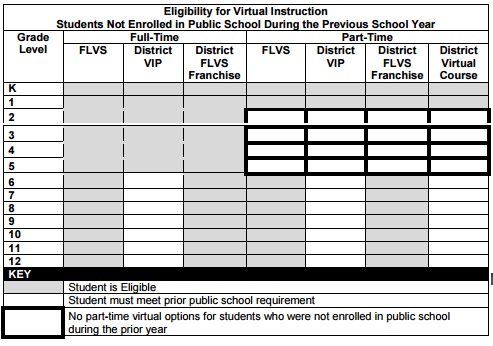
Sherrie Johnson-Ojeda knew she had to find a solution for her son Branden.
The nine-year-old suffers from diabetes and was struggling in a public school in Lake County, Fla.
It became difficult on a day-to-day basis, as Branden was often ill.
“He would come home with pounding headaches and sweat was beating off his forehead,” Johnson-Ojeda said, due to blood sugar levels several times higher than normal.
As a result, she began looking for an alternative for her son and learned about Florida Virtual School.
FLVS functions like a statewide school district, enrolling students in online classes full- and part-time.
Johnson-Ojeda decided to homeschool Branden and enroll him in FLVS Flex, which offers part-time courses, during the 2016-17 school year. She said he made rapid progress.
“He is a straight-A student,” she said of her son’s progress in third grade. “Not only has my son benefited from my teaching, but the interactions with his Florida Virtual School teachers have had a huge impact and difference on my son’s education.”
FLVS gives Johnson-Ojeda more flexibility to schedule doctor appointments for her son and monitor his health more closely, she said.
But whether he can attend FLVS next year remains in question because state law restricts eligibility for virtual schools.
Based on current statutes, Branden is not able to take part-time FLVS courses for his fourth- grade year because he did not attend a public school last year.
Sen. Dennis Baxley, R-Ocala, is trying to change the law, after learning about the restrictions and his granddaughter’s troubles in enrolling in FLVS because she did not attend a public school the previous year.

Baxley filed SB 868, which would eliminate Florida’s last remaining restrictions for part-time virtual courses. Similar legislation by Rep. Jennifer Sullivan, R-Mount Dora, is moving through the House.
“Right now, we need to remove this obstruction requiring you to go to a brick and mortar school before going to a virtual school,” Baxley said. “There are still barriers that have to be broken for us to truly open up opportunities for children to do what works for their family.”
Under existing laws, students in second through fifth grades can’t enroll in virtual courses part-time. Children in middle and high school can only take certain part-time courses if they were enrolled in public schools the previous year.
As a result, FLVS and its district-run franchises must turn some students away. For a number of years, FLVS has been expanding its elementary school offerings after a state law allowed such a change in 2011. Even so, students are unable to enroll in those courses unless they take virtual courses full-time or have attended public school the previous year.
Baxley’s legislation would also extend Florida’s public-school open enrollment policy to virtual charter schools and other virtual programs.
The part-time program known as FLVS Flex serves nearly 200,000 students in K-12, according to Holly Sagues, executive director of FLVS governmental affairs. If Baxley’s bill passes, she said she expects enrollment at the virtual school will increase.
“This bill will remove the last of any restrictions on virtual education in Florida,” she said. “Whether you are a home education student, a public school student or private school student, if you wish to take a virtual course on a part-time course you will now be able to do that without having to meet some eligibility requirements.”
If the legislation does not pass, Johnson-Ojeda said she will be faced with having to put her son back in the public school system or home school him full-time, which would require her to develop a county-approved curriculum.
“It is like reinventing the wheel,” she said. “You have the right to home school your child. The benefit of using FLVS flex is it is an already approved curriculum.”
And her son continues to make progress in FLVS, she added.
“I think in a lot of ways we know the teachers better than we would if Branden was in a brick and mortar school,” she said. “He is receiving all his core curriculum: math, science and social studies. He is also receiving Spanish. Most schools don’t offer Spanish in the third grade. I have a healthy child that will have a healthy future.”



This is great news, and I do hope that this bill passes and allows all students to be eligible for FLVS Flex. However, there is a HUGE ERROR in this article in the paragraph where it states, “If the legislation does not pass, Johnson-Ojeda said she will be faced with having to put her son back in the public school system or home school him full-time, which would require her to develop a county-approved curriculum.”
Homeschooled students in FL do not have to have a county approved curriculum. Homeschooling parents can use any curriculum they choose, and do not have to get any approval from the state, county, or otherwise to use it. The parent is the sole authority on matters of curriculum, instruction, scheduling, and graduation.
Your article makes it sound like counties approve homeschool curriculum – they don’t. The benefit that FLVS Flex has is NOT that it is an approved currculum. The benefit is that it allows parents to outsource the teaching of 1 or more subjects, for free, if they so choose. It allows parents to take advantage of free curriculum from an accredited source, which may or may not be something a parent would want for their child’s education. However, the only one who approves curriculum, is the homeschooling parent.
For reference please see the FL state statute on home education. In it you will see absolutely no provision for the county to approve any curriculum: https://www.leg.state.fl.us/Statutes/index.cfm?App_mode=Display_Statute&URL=1000-1099/1002/Sections/1002.41.html
Yes, I noticed that the article had misstated that the parents had to use a county approved curriculum and it doesn’t!
“If the legislation does not pass, Johnson-Ojeda said she will be faced with having to put her son back in the public school system or home school him full-time, which would require her to develop a county-approved curriculum.” — WHAT? Someone needs to hand her a copy of our home education program statutes to read. There is absolutely NO requirement to use a “county-approved curriculum” in Florida.
Denny – Thank you for raising this issue for clarification.
While it’s true that there are NO legal requirements on homeschool curriculum in Florida, and it would be illegal for a county to impose them on a home educator, it’s also true that virtual courses definitely help make it easier for families to assemble their own standards-based curricula for their children.
Thank you for your comments. This is what the parent told me. She said she could have her curriculum audited at any time. It is her impression that she needs a county approved curriculum. She lives in Lake County.
Thanks for the reply, Livi and Travis.
What the parent calls an audit is actually referred to in the statute as an inspection. The FL statute allows for a portfolio inspection by the county superintendent or their representative. However, a portfolio inspection is for compliance with the statute. In a portfolio inspection the superintendent, or their representative, is only allowed to look for a) samples of work b) log of activities and materials used concurrently with instruction.
The portfolio inspection is not a review or an evaluation. Only a FL certified teacher, chosen by the parent, is authorized to evaluate the portfolio.
An evaluation is a review of the portfolio to determine that the child is making progress, according to the child’s own ability.
At no time during an evaluation, or a portfolio inspection, is the curriculum ever approved or critiqued. While a parent may make known the curricula used, it is not the place of the county superintendent or the evaluator to approve or disapprove of it.
Thanks for helping us clear this up for other parents who may have also been misinformed by their county school districts.
[…] limits on virtual education eligibility. The last remaining restrictions on virtual school eligibility — including those affecting private school and home education students — would be eliminated. […]